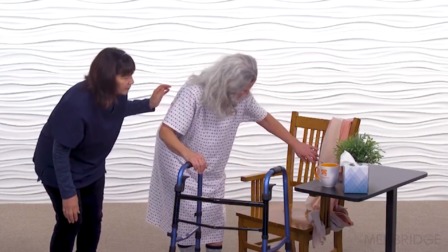Dementia Care: Understanding Common Symptoms for Better Care
Presented by Teepa Snow
12-Month Subscription
Unlimited access to:
- Thousands of CE Courses
- Patient Education
- Home Exercise Program
- And more
The goal of this course is to help care providers, and clinical staff better appreciate the changes that occur in brain structures and functions when someone is living with dementia. In this course, we will review how the brain works, how it fails, and what is possible to notice or observe to guide you in your interactions and responses to better meet the needs of the people for whom you provide care and support. Using simple and practical experiences, you will be better able to appreciate the actions, reactions, inabilities, and frustrations of people living with dementia. Using some of the newest information we have available in understanding dementia, you will be able to provide the best possible care with the fewer errors or misunderstandings.
Meet your instructor

Teepa Snow
Teepa Snow is an advocate for those living with dementia and has made it her personal mission to help families and professionals better understand how it feels to be living with such challenges and seeks to change and improve life for everyone involved. Her practice has included everything from neuro-intensive care units in…
Chapters & learning objectives

1. The New Language of Dementia
This chapter will review the meaning of dementia: a syndrome with multiple forms/types: progressive, irreversible, and terminal. The course will also cover what happens to the brain when Alzheimer’s starts (chemical changes) and progresses (structural changes) resulting in constant variability with a forward progression of deterioration overall.

2. What is Changing in the Brain and What Happens in Care Situations? Part One
This chapter will discuss and demonstrate typical behaviors that accompany changes in the ability for the following functions in combination with ineffective versus effective caregiver responses and interaction behaviors: memory, way-finding, and time awareness abilities, language abilities compared to a hearing capacity.

3. What is Changing in the Brain and What Happens in Care Situations? Part Two
This chapter will discuss and demonstrate typical behaviors that accompany changes in the ability for the following functions in combination with ineffective caregiver responses and interaction behaviors: pre-frontal executive control abilities, threat perception, pleasure-seeking, and needs meeting changes, core life function changes, sensory-motor abilities, visual abilities.

4. Choosing to Address the Changes in the Brain During Care
This chapter will discuss and demonstrate typical behaviors that accompany changes in the ability for the following functions in combination with effective caregiver responses and interaction behaviors: pre-frontal executive control abilities, memory, way-finding, and time awareness abilities, threat perception, pleasure-seeking, and needs meeting changes, core life function changes, language abilities compared to hearing capacity, sensory-motor abilities, and visual abilities. Role play of various situations will be used to demonstrate effective alternatives to these various symptoms of the condition.

5. Recognizing For All That is Lost, There is Something Left
This chapter will review the value of noticing changes in ability when attempting interactions and providing care and support.
More courses in this series

Overview of Dementia: Alzheimer's, Vascular, Lewy Body, Frontotemporal
Teepa Snow

Dementia Care: Understanding Common Symptoms for Better Care
Teepa Snow

Dementia Care: Reducing the Risk of Challenging Situations
Teepa Snow

Dementia Care: Coping with Challenging Situations in Support & Care
Teepa Snow

Dementia Care: Using the GEMS States Model for Personal Care Tasks
Teepa Snow

Dementia Care: Communicating When Someone Has Dementia
Teepa Snow

Dementia Care: Offering Engagement for People Living With Dementia
Teepa Snow

Dementia Care: Helping as Abilities are Failing and Life is Ending
Teepa Snow